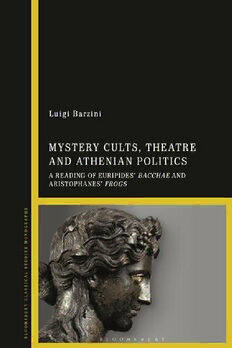
Mystery Cults, Theatre and Athenian Politics: A Reading of Euripides’ Bacchae and Aristophanes’ Frogs PDF
281 Pages·2021·2.589 MB·English
Most books are stored in the elastic cloud where traffic is expensive. For this reason, we have a limit on daily download.
Preview Mystery Cults, Theatre and Athenian Politics: A Reading of Euripides’ Bacchae and Aristophanes’ Frogs
Description:
This new comparative reading of Euripides’ Bacchae and Aristophanes’ Frogs sets the two plays squarely in their contemporary social and political context and explores their impact on the audiences of the time. Both were composed during a crucial period of Athenian political life following the oligarchic seizure of power in 411 BC and the restoration of democracy in 410 BC, and were in all likelihood produced nearly simultaneously a few months before the rise of the Thirty Tyrants and the ensuing civil war. They also demonstrate significant similarities that are particularly notable among extant Attic theatre productions, including the role of the god Dionysos as protagonist and architect of religious and political action, and the presence of Demetrian and Dionysiac mystic choruses as proponents of the appeasement of civil discord as the cure for Athens’ ills.Focusing on the mystic, civic and political content of both Bacchae and Frogs, this volume offers not only a new reading of the plays, but also an interdisciplinary perspective on the special characteristics of mystery cults in Athens in their political context and the nature of theatrical audiences and their reaction to mystic themes. Its illumination of the function of each play at a pivotal moment in fifth-century Athenian politics will be of value to scholars and students of ancient Greek drama, religion and history.
See more
The list of books you might like
Most books are stored in the elastic cloud where traffic is expensive. For this reason, we have a limit on daily download.
